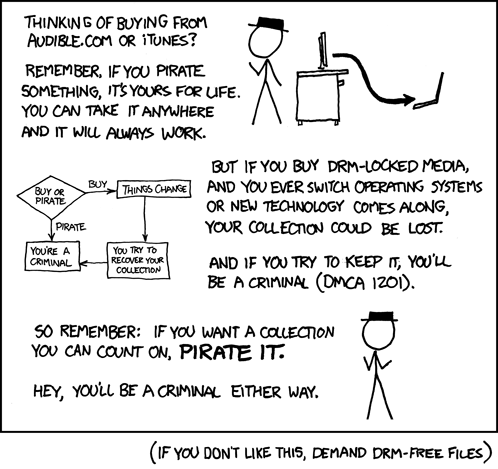US cell phone unlocking law: a temporary fix to only part of the problem
22 de Agosto de 2014, 7:48 - sem comentários aindaSubmitted by Donald Robertson on August 21, 2014 - on defectivebydesign.org
Unfortunately, nearly two years later, the government's response is not fully satisfactory. President Obama has signed into law the Unlocking Consumer Choice and Wireless Competition Act. The law repeals the 2012 Library of Congress ruling on unlocking cell phones and re-implements the previously existing exemption. It also encourages the Library of Congress to consider whether this exemption should be extended to other wireless devices next year when the next round of exemptions will be implemented. Finally, while it allows users to have someone unlock their phone for them, it does not permit so-called "bulk unlocking," where someone buys multiple phones and unlocks them for resale.
The law as passed restores the right to unlock your cellphone, at least until the next round of exemptions come out, which is less than a year from now. It is great that users once again have the ability to unlock their cellphones, and Congress and the President should be commended for acting on an issue that is important to so many. But when it takes two years to correct a mistake that can happen every three years, users are left with only a short window to enjoy their rights before they are taken away again. And while the law encourages the Library of Congress to consider applying the same exemption to other devices like tablets, the Library of Congress is free to once again ignore the rights of users in regards to their hardware. Even if the Library of Congress were to follow that recommendation, nothing in the law even mentions the right to install your own software on your other wireless devices, and doesn't address at all other hardware items like video game consoles. That leaves users in a terrible position. Additionally problematic is the law's carve out on "bulk unlocking."
Users must be able to install and run free software operating systems like Replicant and GNU/Linux on any computer they own, to protect themselves from proprietary software companies, and make their computers work the way they want. They must be permitted to do this themselves, or ask someone else to do it for them.
What we are left with is a temporary fix to a continuing problem, and one that doesn't even fully address all the ways in which the DMCA anti-circumvention provisions block users from fully enjoying their rights with the devices they own. It is not a situation that we can stand idly by and let pass.
Here's what you can do to help:
- Join our Defective by Design campaign to end DRM. We'll alert you when the next opportunity for comment arises.
- Donate to the Defective by Design campaign to support our efforts to protect computer users all around the world.
- If you're in the US, make sure to let your representatives know how you feel about this issue.
Dia 4 de Maio ⇒ Dia contra DRM
4 de Maio de 2011, 0:00 - sem comentários aindaHoje é o dia de combate ao DRM (Digital Rights Management). Você sabe o que é isso? Muito além do software proprietário, esta é a nova fronteira de guerra pela liberdade.
- Conheça a campanha "Defeituoso por Projeto"
- Participe da campanha "DRM? Não Compro!"
Você já ouviu falar de "Trusted Computing" (Computação Confiável)? Essa é uma das estratégias do DRM. um chip vai dizer o que você pode ou não executar, e ele tem mais controle sobre a máquina que o seu sistema operacional.
Assista o vídeo "O que a Computação Confiável tem de confiança?"
Eles já decidiram NÃO confiar em você. Download Legenda
Fim dos Geeks e o DRM Vive
2 de Dezembro de 2010, 0:00 - sem comentários aindaQuando então, a grande indústria da mídia/software aceitará a realidade, e considerará alternativas mais viáveis?
Você sempre será um criminoso!!!
2 de Dezembro de 2010, 0:00 - sem comentários aindaBem, pra que resistir?
 |
|
|



